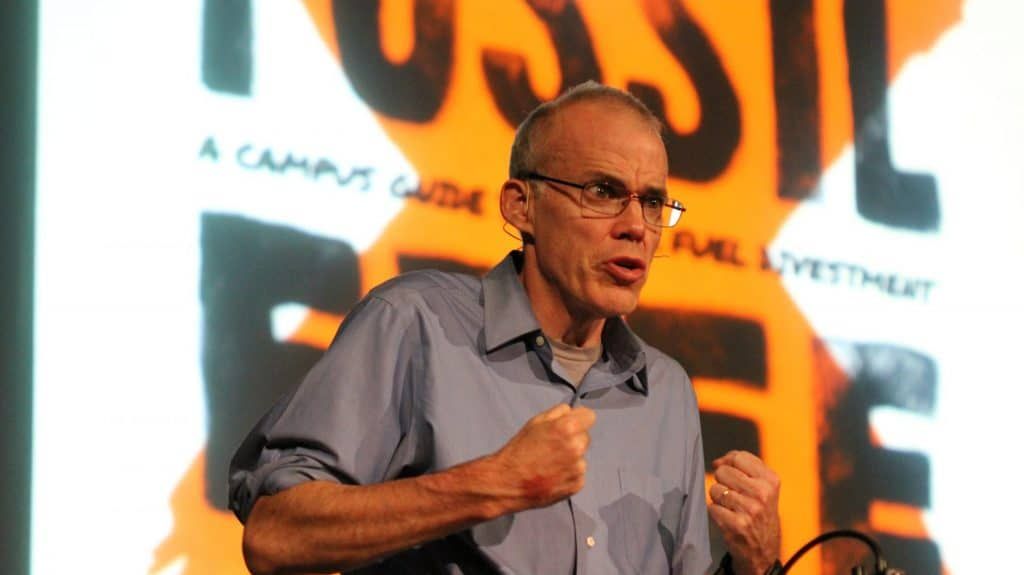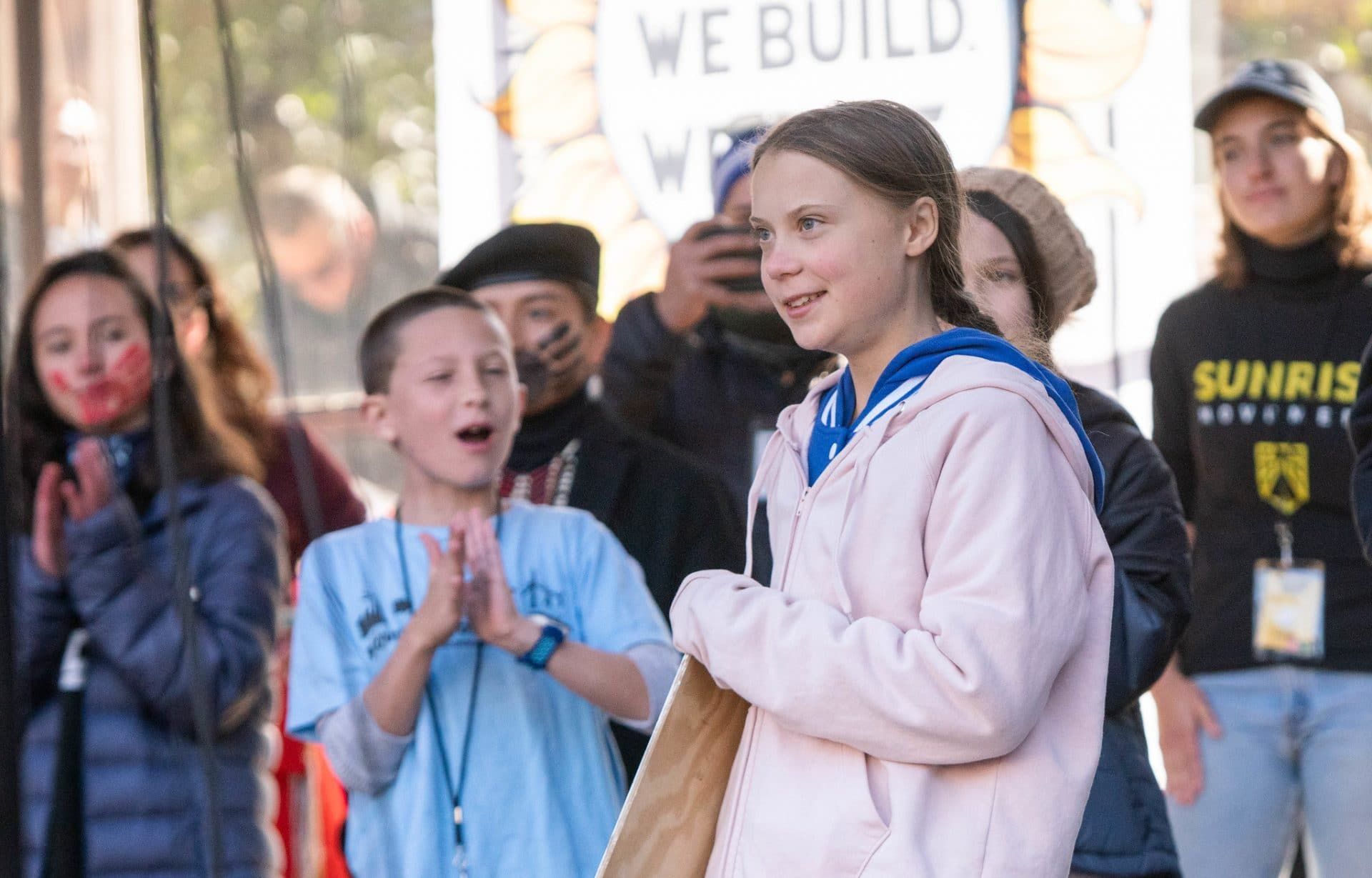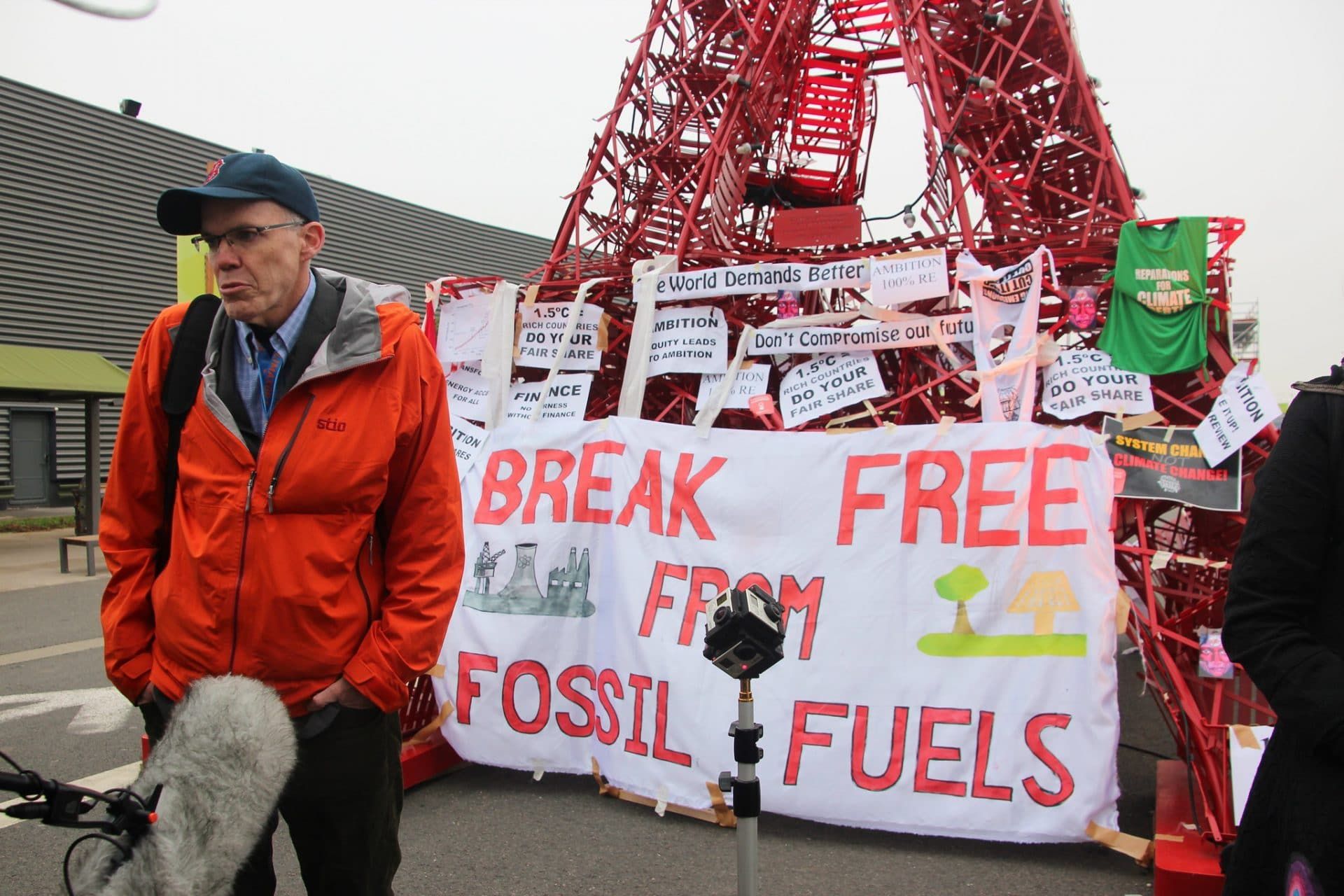Interview: Author and activist Bill McKibben on the “timed test” of the climate crisis
By Jessica McKenzie | December 16, 2021
 Photo by Steve Liptay
Photo by Steve Liptay
When it comes to the climate crisis, author and environmentalist Bill McKibben hasn’t been a fully “objective journalist” since he finished penning his first book, The End of Nature, over three decades ago, and realized he didn’t want the world to burn up. While McKibben continues to write on the subjects of climate and the environment for publications like The New Yorker, The Nation, and the Bulletin, in recent years his attentions and energies have been at least equally spent on climate activism. The organization that McKibben and others founded in 2008, 350.org, is now a vast operation that has affiliations with some 300 other climate organizations around the world.
Earlier this year, McKibben founded a new group for Americans over the age of 60 called Third Act and started a Substack newsletter called The Crucial Years. In an interview with Bulletin associate editor Jessica McKenzie, McKibben discusses these new endeavors, when he realized the fight over climate was more about money and power than science and evidence, the technological shifts that make climate action easier now than 10 years ago, and which environmental crisis McKibben believes is underappreciated by the general public.
Bulletin of the Atomic Scientists: It’s been over 30 years since your book, The End of Nature was published, one of the first books on global warming for a general audience. How has your activism changed over the years?
Bill McKibben: Well, that’s actually a really good question because when I started, I wasn’t really an activist. I was a writer. My first job out of college was on the staff of The New Yorker, writing the Talk of the Town and all of that.
When I wrote The End of Nature, by the time I was halfway through it, I knew that I wasn’t objective in the sense that newspaper reporters are supposed to be. I really did not want the world to overheat and burn up. But for the next 10 years or so, I still perceived my job mostly as doing more writing and speaking, drawing attention to this issue.
And my thinking was—naively, I now understand: If only people are aware of this, then our leaders will do what they need to do and go to work to solve this problem, because why wouldn’t they? Scientists have given a warning about the deepest problem the planet’s ever faced. Of course, we’ll get to work on it.
It took me too long to understand that we were winning the argument. The science was robust and clear within a few years. We were winning the argument. We were just losing the fight because the fight turned out not really to be about physics and data and the reasons. And the fight turned out to be about money and power, which is what fights are usually about.
And on the other side of this fight, the fossil fuel industry, was the richest industry in the world, and they were using their money to spread a truly dangerous lie. The lie that we didn’t know what was true about climate change, and we could wait, and so on and so forth.
They’ve wasted 30 years of our time. And we’ve tried to react by building power of our own, lacking billions of dollars. We’ve tried to, and with some effect, substituted millions of people. And so we’ve built these big, vast movements across the world that are finally counterbalancing that power and allowing us to at least begin, albeit much too late, the process of change.
Bulletin: Speaking of movements, you recently started a new organization called Third Act, which will mobilize individuals over the age of 60. Why do you think it’s important to engage individuals of a certain age? What do you hope to achieve?
McKibben: Since I started working on this in my 20s, I’ve gotten to work a lot with youth around the world, and they’re doing an unbelievable job. The youth activism around climate’s fantastic. Everybody knows about Greta Thunberg. They should. She’s great. I adore her and love working with her.

Anthony Quintano/Flickr)
But there are 10,000 Greta Thunbergs around the planet, and they’ve got 10 million followers, and that is fantastic. But it does not really seem okay to just assign the worst problem the world’s ever gotten into to a bunch of 17-year-olds as a kind of homework. It seems unfair, and it also seems unlikely to succeed.
So look at our society, people over the age of 60—and there’s now 70 million of us, so a population larger than France. We vote in huge numbers, so our political power is outsized, and we have most of the money. Seventy percent of the financial assets in the country belong to Baby Boomers or the Silent Generation. Millennials have five percent. So if we’re going to move economic and political institutions, we’re probably only going to succeed if we can get older people involved.
Now, there’s this idea that as people age, they become more conservative. We can’t afford to let that happen. And I think for this generation in particular, it’s not necessarily going to happen. People who are above the age of 60, in their first act, they saw a profound, cultural, social, political transformation. They were around for the start of the women’s movement or the first Earth Day or whatever it was.
And maybe our second act, taken as a whole, was a little more bound up with consumerism than with citizenship. Perhaps, that ship has now sailed. We’re in our third act, we’ve got skills, resources, maybe some grandkids, a real feeling for the legacy that we’re about to leave behind, and it’s not a very good one. So [maybe these older] people are eager to join and follow the lead of young people, make real change, make it happen, make it count.
Bulletin: Anecdotally, I’ve seen a lot of cynicism online from Generation Z about the mess that boomers have left behind, especially the climate crisis. How will Third Act play nice with the youth climate movement?
McKibben: So, good example: In October, the youth climate movement Future Coalition, the sort of American outgrowth of Greta’s Fridays for Future group, was starting this campaign against the big banks that are the big funders of the fossil fuel industry. Banks like JPMorgan Chase, which has sent about a third of a trillion dollars to the fossil fuel industry since the Paris climate accords were signed.
So they were going to go demonstrate outside banks and things, but they called us up and said, “Will you come join us?” Because we know that bank managers are worried about 19-year-olds. For some reason they want them to take out their credit card, because they know they’ll stick with the first one they take for the rest of their life, and so on.
But we know that they’re also scared about 69-year-olds, because that’s whose money sits in the vaults. And so it was great fun to back them up. I was in Boston that day and part of a big demonstration of older people following younger people down the street, someone had a big sign that said, “Fossils against fossil fuels.” That was a worthwhile banner to march under.
Bulletin: I understand that just a few days ago you had the first organizing call for Third Act.
McKibben: It was our big national, official launch, hard launch as it were. It went great. And one of the things that it emphasized was real—there was a lot of music and art partly because this generation, my generation has, Jessica, the best music that there was. But partly because the environmental movement anyway has done a better job of appealing to whichever hemisphere of the brain it is that likes bar graphs and pie charts. That’s an important hemisphere of the brain, but the other one, the one that reacts to the world more viscerally, we need that engaged, too. So there’s going to be a lot of art and culture here.
Bulletin: At the same time that you first launched Third Act, you started a Substack. I was wondering—since you’ve written more than a dozen books and you were a staffer and then a contributing writer at The New Yorker and have bylines at so many other places—you’ve had a considerable pulpit from which to share your writing and your thoughts. How is the move to a more self-published newsletter changed your reader-writer relationship?
McKibben: Well, it’s been fun. Truthfully, I’ve kept writing tons for everybody else, and I’ve written a lot for The New Yorker and will keep doing that. But there’s a limit as to how much organizing you can do in the pages of big national magazines. That’s not really what they’re about.
But that’s one of the nice things about this Substack; it’s like long-form Twitter. You can organize. You can say, “Here’s the thing and how to rally around it,” and so on and so forth.
So I’ve enjoyed that part. It is a lot like Twitter because you just write something and you can do it fairly quickly and punch a button and it’s out and people can read it and you can get back to whatever you were doing before.
Bulletin: And you’re playing around with a serial novel. Tell me about your “epic, non-violent yarn” and what it has to do with climate action.
McKibben: I’m not really a novelist. I did write a novel called Radio Free Vermont that actually did pretty well and got good reviews, but it was really more of a kind of yarn, as is this new one, and this is kind of the prequel/sequel to it.
What they’re both about is something that interests me immensely, which is nonviolence and nonviolent movement building. I think it’s way more dramatic than the violence that is the hallmark of most of our entertainments.
At a certain point, just the thought of watching one more Marvel, whatever, because they all end up with people having fistfights, whether or not they have titanium fists or whatever it is. But at a certain level, it’s just dull as dishwater.
But the stuff that came out of the dramas that came out of the civil rights movement, out of Gandhi and organizing, out of the work that people are doing today, completely fascinate me. Because they’re really about ways that the powerless can figure out how to take on the powerful and take them down. And it turns out that it’s extraordinarily effective.
The academics who study nonviolence say that it’s three or four times more effective than violent movements in bringing about change. But nobody really tells these stories. We don’t have a West Point for nonviolence.
Bulletin: And is it specifically about climate?
McKibben: No, there’s a little bit of that, but a part of it is set in Tibet, in India, and all over the place. Because truthfully, there’s no way to isolate issues like climate from other issues at this point. One of the things we’re working on hard at Third Act is questions around functioning democracy, because we’re not going to solve climate change if we can’t overcome the insane power of special interest in our democracies.
Bulletin: Speaking of power, at the beginning of this year, you wrote an article for the Bulletin in which you really foresaw the uphill battle that Joe Biden has faced getting any sort of climate legislation made into law, including the stonewalling by politicians like Joe Manchin. How are you feeling about his performance on climate now, about a year in?
McKibben: I think that to a very large degree, the fossil fuel industry has managed to checkmate a lot of his work. Joe Manchin has taken more money from the fossil fuel industry than anybody else in Washington. Which let me tell you is no easy thing to do because there’s a lot of them vying for that crown. But man, was it money well spent! Because he’s stripped the clean energy pricing plan out of the Build Back Better bill. And now he’s, for the moment anyway, just holding the whole thing up.
Bulletin: But you saw that coming, which I think is really, shows a lot of foresight.
McKibben: I’m afraid that after watching for 30 years, I have a great deal of respect for the invidious power of this industry. It’s interesting because they’re clearly losing 20 years, 30, 40 years from now. The world is clearly going to run on sun and wind because it’s, among other things, cheap.

But these guys may have the power to preserve their business model past the point where they break the climate system of the Earth. That’s what we’re fighting about now. Can we break the political power of Exxon at all before they break the climate system? And it’s a race and we don’t know the answer.
There are places where we’re making huge progress. These divestment campaigns have been really important, partly because they’re outside the ability of these politicians to control, because they’re not aimed at governments, they’re aimed at universities and pension funds. And we’re now at $40 trillion in endowments and portfolios that have divested from fossil fuel. It’s the biggest movement of its kind in history.
But, while we’re doing that, they’re continuing to prop up the Manchins of the world. So, we don’t know how this race is going to come out, and it’s worth remembering that it is very much a timed test. Which is unlike everything else we’ve dealt with in a sense, even including the nuclear threat where the job has been—and job well done—to try and keep bad things from happening and hope that eventually we’ll come to our senses and get rid of all these things.
In this case, the bad things are happening all around us. And if we can’t stop them quickly, then the die will be cast. Once the Arctic’s melted, no one’s got a great plan for how you’re going to go refreeze it.
Bulletin: The most recent headlines about Biden and his disappointments for environmentalists have been about the record number—as compared to Trump’s first three years—of leases he’s allowed on public lands for oil and gas companies. What’s going on there? Can you put that in the context?
McKibben: I don’t really know. The Biden administration tried to stop some of that very early on and a federal court ruled that they couldn’t. And so now they’re granting these things. There are people who say they don’t have to, and they could be figuring out other ways to resist. There are people saying they don’t want to do that because it’ll further antagonize the Manchins of the world and make it that much harder to pass through.
I don’t really know the outcome, but I know that it’s a great sadness. I got arrested outside the White House in October as part of this People vs. Fossil Fuels campaign. And we were talking about those leases and also about line three, this tar sands pipeline through Minnesota that was approved this year, which is crazy because it is a perfect doppelganger of the Keystone XL pipeline. Same size, carrying the same stuff.
Ten years ago, the Obama-Biden administration recognized that we couldn’t build Keystone XL because of its climate impact. So God knows what political calculation is making it okay to go build this one.
Bulletin: Atmospheric carbon dioxide concentrations are currently hovering around 415 parts per million, which is well above the 350 parts per million ceiling that you helped make the bar, the line that should not be crossed. How can you see figures like that and not despair?
McKibben: Oh, I despair a good deal at the time, Jessica. The first book I wrote about this 33 years ago now had the tearful title, The End of Nature. So I’m no Pollyanna about it. We’re not going to get out of this without a great deal of pain and damage.
Climate change is not something that’s going to happen in the future. It’s something that’s happening now. The question is, can we stop it short of the point where it cuts civilizations off at the knees? And we don’t know the answer to that. It’s an open question. It’ll depend a lot on what happens in the next few years.
We’ve locked in one degree of warming, and we’ve probably locked in, just from momentum, something altogether too close to two degrees of global warming. That’s going to be really hard to deal with. But we’re on a path right now, unless we deviate from it sharply, that takes us to three degrees Celsius, six degrees of Fahrenheit. If that happens in the course of this century, I think the thinking of most scientists is it’s going to be very hard to have civilizations like we’re used to. That rate of violent chaotic flux is really like nothing the Earth has dealt with, at least since the time when the last big asteroid slammed into us.
And, this time the asteroid is us, and that means we don’t have to do it. We can still cushion this impact if we act swiftly and powerfully. So that’s why we keep trying. It’s why it seems so urgent. It’s why I keep ending up in jail and whatever. At some level, it’s all crazy, why we have to do any of this in order to get the powers that be to pay attention to clear scientific warning. But clearly, we do. So I’m glad there’s lots of people who are willing to do it.
Bulletin: This urgency is part of the title of your Substack, The Crucial Years. How many years would you say that entails?
McKibben: Well, to me, the really relevant years right now are through 2030. The Intergovernmental Panel on Climate Change has said quite clearly, “Cut emissions in half by 2030 or the chances of meeting the targets you set in Paris, are basically by the board.” 2030 is now eight years and a tiny bit of change away.
That’s not much time. That’s a blink of an eye. And that means we’ve got to be doing everything we can. And then we’ll reevaluate. We may reach 2030 and just be like, “You know what? This is not working and we’re going to have to break the glass. And do what? Geoengineering or some other crackpot scheme.”
But for the moment, the fact that the price of solar and wind energy has fallen so fast gives us the one real opening we’ve had since the beginning of this climate fight. There’s no longer a technological or financial obstacle to doing what needs to be done. There’s just a vested interest in inertia obstacle. Those are strong, but we can overcome them, I think.
Bulletin: I think the last interview you did with the Bulletin was back in 2012, and there had just been a global meeting of leaders in which they were kicking the can down to 2020. And it was interesting to read how little has changed in a decade.
McKibben: Yep. We’re obviously at some kind of hinge moment now, because what’s changed from 2012 is this availability of a reasonably priced alternative. But what hasn’t changed is the firm insistence of the fossil fuel industry that they’re not having it, that they’re going to do everything they can to keep their business model intact a little longer.
And the idea that we’re going to lose a huge part of the planet’s DNA and degrade the planet, all so Exxon can postpone for another 15 years the financial reckoning for their shareholders. That’s pretty much the definition of insane.
Bulletin: What would be your game plan if someone put you in charge?
McKibben: Stop building anything new that connects to a flame, period. So no more expansion of anything to do with fossil fuels or biomass, and instead, the radical, dramatic support from governments around the world for the rapid deployment of technology that’s now on the shelf and ready to go.
We know that we’re capable of doing this. In the two years before our entry into World War II, we transformed our industrial system into building nothing but tanks and planes. So there’s no reason we can’t do it to build solar panels and wind turbines. There’s no physical constraint that keeps us from doing it.
There’s stuff that’s hard. We have to figure out lithium supplies and how not to destroy people by mining for cobalt and things. But those are manageable human challenges. What we can’t do is just let any more of the physical systems of the planet break down because those aren’t recoverable. That’s a one-way ratchet, and that’s what scares me.
Bulletin: What’s a big climate or environment issue you think is under-appreciated by the public?
McKibben: The fact that we’ve changed the chemistry of the Earth’s oceans. Look, this planet’s 70 percent seawater. If we’d been naming it honestly, we would’ve called it Ocean. And the fact that we’ve dramatically shifted the pH of seawater in the course of 30 years is a bad sign. That’s global warming’s evil twin, and we haven’t paid as much attention to it as we need to.
Bulletin: Last question: No matter how often climate activists like yourself stress that addressing the climate crisis requires structural change, primarily people want to know how they can help as individuals. What’s one thing people could do today, or tomorrow?
McKibben: The most important thing an individual can do is be a little less of an individual, Jessica. You got to join together with others in movements big enough to actually matter. I’m glad I got solar panels all over the roof and all of that, but I don’t try to fool myself that we’re going to make this math work one Tesla at a time.
That’s why we start things like thirdact.org or 350.org, ways for people to aggregate their concern and provide enough leverage to shift systems.
Together, we make the world safer.
The Bulletin elevates expert voices above the noise. But as an independent nonprofit organization, our operations depend on the support of readers like you. Help us continue to deliver quality journalism that holds leaders accountable. Your support of our work at any level is important. In return, we promise our coverage will be understandable, influential, vigilant, solution-oriented, and fair-minded. Together we can make a difference.
Keywords: Bill McKibben, climate change activism, climate crisis, fossil fuel companies, the end of nature
Topics: Climate Change, Interviews















Yay Bill! Thank you for your thoughtful observations and considerable actions. I’m just about to hit 60 and my partner and I live remotely in Australia so hard to join any movement from afar but we live frugally off grid and care for “our” land with conservation the main objective. We also bang on to family and do some subversive public service to wake up our conservative community to this climate and ecological crisis. Great point about the arts being an important part of change activism. Thanks to the Bulletin for this great interview and hiliting of the perils we… Read more »